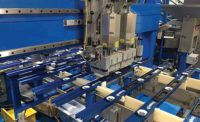For any plastic-injection-molding tooling company, nothing is more important than making sure its molds allow for consistent, quick and clean demolding of just-made parts. So anything that helps the company achieve this crucial goal is worth pursuing.
Engineers at Franke Kunststofftechnik GmbH & Co. KG (FKGC)—a German injection molding tool specialist—have successfully followed this philosophy for more than 30 years. Recently, it met with FIPA Inc. in search of a gripper that can demold plastic battery covers from an eight-cavity mold and then place the covers on a conveyor for transfer to another workstation.
FKCG engineers selected FIPA because of its reputation as a leading manufacturer of advanced vacuum technology, gripper systems and end-of-arm tooling (EOAT). At the same time, the engineers knew that any vacuum cup capable of part demolding must be resistant to high temperatures and not leave any marks on the material being demolded.
“After thoroughly discussing and reviewing Franke’s technology application needs, we realized our Thermalon bellows vacuum cups would be an ideal solution for this particular project,” explains Timo Bendrat, sales manager for Western Germany at FIPA. “[These] cups are comprised of a material [that is] optimized for the specific needs of the plastics industry. It is heat-resistant up to 320 F and low-marking.”
The custom cups designed by FIPA engineers integrate several components of the company’s lightweight gripping systems. This design not only ensures rapid and reliable gripping of parts from the mold to achieve a high output. It also optimizes cost-effectiveness, according to Bendrat.
Each vacuum cup weighs less than 2.5 kilograms and requires only two seconds for demolding. Total cycle time (from injection molding to placing) is just 19.2 seconds, enabling FKGC to achieve a production throughput of up to 1 million parts per year.
“It was a pleasure to work with FIPA, [which] responded quickly to our inquiry, and worked diligently to ensure that this project ran smoothly and was managed in a timely fashion,” notes Niklas Franke, application technology manager at FKGC. “The result was a highly effective and cost-sensitive solution that met our application technology requirements.”
In business since 1989, FKGC offers a wide range of injection molding services for customers in the automotive, heating, solar, window and electronics industries. These services include the development, simulation, prototyping and building of injection molds that weigh up to 19 tons. Franke also contracts to produce injection-molded thermoplastic parts. Its current equipment lineup includes 15 state-of-the-art machines with clamping forces ranging from 50 to 1,500 tons.
As for FIPA, it makes both custom and standard grippers. Within its standard line, the company’s series 90, 100 and 130 grippers are designed for unloading freshly molded plastic parts. These grippers have a long life cycle due to their high-strength aluminum alloy housing and jaws, with a durable, corrosion-resistant anodized coating.
Compact Series 90 grippers reliably grip small sprues (channels through which metal or plastic is poured into a mold) due to their high closing force. Series 100 models securely grip medium, large, thin and flat sprues with gap-free closing. Series 130 grippers feature a wide jaw opening, making them ideal for large sprues. Optional sensors can confirm that a gripper has successfully picked up a part.
FIPA Inc.'s EOAT is used in packaging, assembly and material handling systems. For more info, call 919-651-9888 or visit www.fipa.com.




